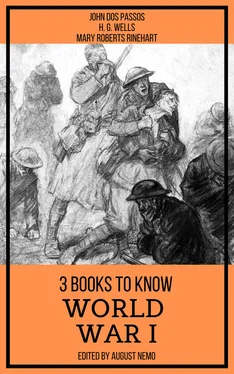
JOHN ANDREWS STOOD naked in the center of a large bare room, of which the walls and ceiling and floor were made of raw pine boards. The air was heavy from the steam heat. At a desk in one corner a typewriter clicked spasmodically.
“Say, young feller, d'you know how to spell imbecility?”
John Andrews walked over to the desk, told him, and added, “Are you going to examine me?”
The man went on typewriting without answering. John Andrews stood in the center of the floor with his arms folded, half amused, half angry, shifting his weight from one foot to the other, listening to the sound of the typewriter and of the man's voice as he read out each word of the report he was copying.
“Recommendation for discharge”... click, click..."Damn this typewriter.... Private Coe Elbert”... click, click. “Damn these rotten army typewriters.... Reason... mental deficiency. History of Case....” At that moment the recruiting sergeant came back. “Look here, if you don't have that recommendation ready in ten minutes Captain Arthurs'll be mad as hell about it, Hill. For God's sake get it done. He said already that if you couldn't do the work, to get somebody who could. You don't want to lose your job do you?”
“Hullo,” the sergeant's eyes lit on John Andrews, “I'd forgotten you. Run around the room a little.... No, not that way. Just a little so I can test yer heart.... God, these rookies are thick.”
While he stood tamely being prodded and measured, feeling like a prize horse at a fair, John Andrews listened to the man at the typewriter, whose voice went on monotonously. “No... record of sexual dep.... O hell, this eraser's no good!... pravity or alcoholism; spent... normal... youth on farm. App-ear-ance normal though im... say, how many 'm's' in immature?”
“All right, put yer clothes on,” said the recruiting sergeant. “Quick, I can't spend all day. Why the hell did they send you down here alone?”
“The papers were balled up,” said Andrews.
“Scores ten years... in test B,” went on the voice of the man at the typewriter. “Sen... exal ment... m-e-n-t-a-l-i-t-y that of child of eight. Seems unable... to either.... Goddam this man's writin'. How kin I copy it when he don't write out his words?”
“All right. I guess you'll do. Now there are some forms to fill out. Come over here.”
Andrews followed the recruiting sergeant to a desk in the far corner of the room, from which he could hear more faintly the click, click of the typewriter and the man's voice mumbling angrily.
“Forgets to obey orders.... Responds to no form of per... suasion. M-e-m-o-r-y, nil.”
“All right. Take this to barracks B.... Fourth building, to the right; shake a leg,” said the recruiting sergeant.
Andrews drew a deep breath of the sparkling air outside. He stood irresolutely a moment on the wooden steps of the building looking down the row of hastily constructed barracks. Some were painted green, some were of plain boards, and some were still mere skeletons. Above his head great piled, rose-tinted clouds were moving slowly across the immeasurable free sky. His glance slid down the sky to some tall trees that flamed bright yellow with autumn outside the camp limits, and then to the end of the long street of barracks, where was a picket fence and a sentry walking to and fro, to and fro. His brows contracted for a moment. Then he walked with a sort of swagger towards the fourth building to the right.
John Andrews was washing windows. He stood in dirty blue denims at the top of a ladder, smearing with a soapy cloth the small panes of the barrack windows. His nostrils were full of a smell of dust and of the sandy quality of the soap. A little man with one lined greyish-red cheek puffed out by tobacco followed him up also on a ladder, polishing the panes with a dry cloth till they shone and reflected the mottled cloudy sky. Andrews's legs were tired from climbing up and down the ladder, his hands were sore from the grittiness of the soap; as he worked he looked down, without thinking, on rows of cots where the blankets were all folded the same way, on some of which men were sprawled in attitudes of utter relaxation. He kept remarking to himself how strange it was that he was not thinking of anything. In the last few days his mind seemed to have become a hard meaningless core.
“How long do we have to do this?” he asked the man who was working with him. The man went on chewing, so that Andrews thought he was not going to answer at all. He was just beginning to speak again when the man, balancing thoughtfully on top of his ladder, drawled out:
“Four o'clock.”
“We won't finish today then?”
The man shook his head and wrinkled his face into a strange spasm as he spat.
“Been here long?”
“Not so long.”
“How long?”
“Three months.... Ain't so long.” The man spat again, and climbing down from his ladder waited, leaning against the wall, until Andrews should finish soaping his window.
“I'll go crazy if I stay here three months.... I've been here a week,” muttered Andrews between his teeth as he climbed down and moved his ladder to the next window.
They both climbed their ladders again in silence.
“How's it you're in Casuals?” asked Andrews again.
“Ain't got no lungs.”
“Why don't they discharge you?”
“Reckon they're going to, soon.”
They worked on in silence for a long time. Andrews stared at the upper right-hand corner and smeared with soap each pane of the window in turn. Then he climbed down, moved his ladder, and started on the next window. At times he would start in the middle of the window for variety. As he worked a rhythm began pushing its way through the hard core of his mind, leavening it, making it fluid. It expressed the vast dusty dullness, the men waiting in rows on drill fields, standing at attention, the monotony of feet tramping in unison, of the dust rising from the battalions going back and forth over the dusty drill fields. He felt the rhythm filling his whole body, from his sore hands to his legs, tired from marching back and forth from making themselves the same length as millions of other legs. His mind began unconsciously, from habit, working on it, orchestrating it. He could imagine a vast orchestra swaying with it. His heart was beating faster. He must make it into music; he must fix it in himself, so that he could make it into music and write it down, so that orchestras could play it and make the ears of multitudes feel it, make their flesh tingle with it.
He went on working through the endless afternoon, climbing up and down his ladder, smearing the barrack windows with a soapy rag. A silly phrase took the place of the welling of music in his mind: “Arbeit und Rhythmus.” He kept saying it over and over to himself: “Arbeit und Rhythmus.” He tried to drive the phrase out of his mind, to bury his mind in the music of the rhythm that had come to him, that expressed the dusty boredom, the harsh constriction of warm bodies full of gestures and attitudes and aspirations into moulds, like the moulds toy soldiers are cast in. The phrase became someone shouting raucously in his ears: “Arbeit und Rhythmus,”—drowning everything else, beating his mind hard again, parching it.
But suddenly he laughed aloud. Why, it was in German. He was being got ready to kill men who said that. If anyone said that, he was going to kill him. They were going to kill everybody who spoke that language, he and all the men whose feet he could hear tramping on the drill field, whose legs were all being made the same length on the drill field.
Читать дальше













